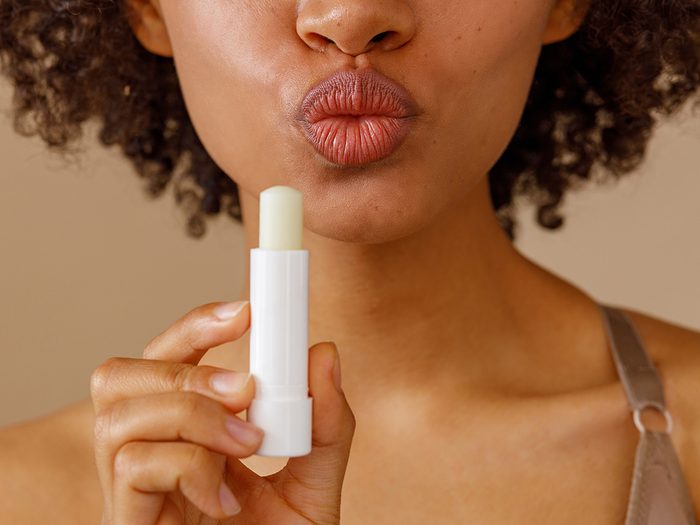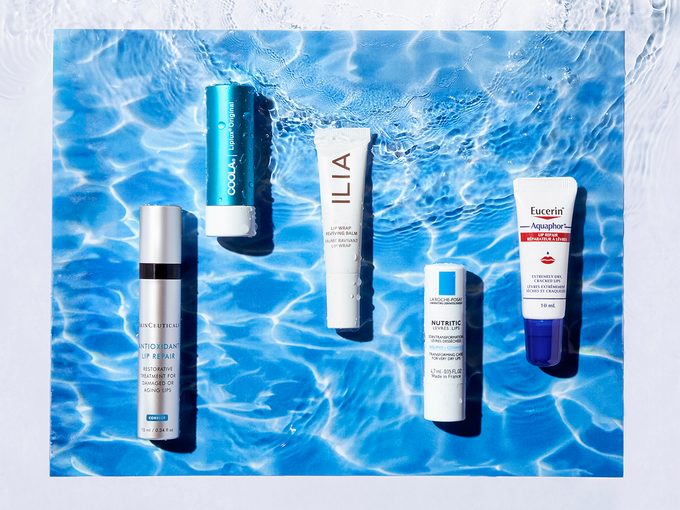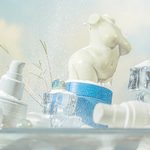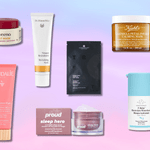Calling All Lip Balm Addicts

Can’t leave home without lip balm? Here’s what dermatologists have to say about that.
Keys, wallet, phone, lip balm. For many of us, a good balm is an item we can’t leave home without. But why do our lips constantly need a hydrating product? Is this normal, or could there be a deeper, underlying issue?
According to Monica Li, a double board-certified dermatologist in Vancouver, the main reason for your dry pout is that lips don’t have sebaceous (oil) glands, which are responsible for keeping skin moisturized. That means your lips are more susceptible to dryness than the rest of your skin and require more care. Add a cold and dry climate into the mix, and you’ll experience even more moisture loss, says Li. That’s why chapped lips are so common in the winter. While high humidity levels (think warm July days) help lips feel hydrated because of the extra moisture in the air, low humidity levels (think frosty February nights) can suck moisture out.
But other circumstances can lead to dry lips, too. Li says being dehydrated, over-licking, using a strong skin care product like retinol near your lips andside effects from medications such as the skin-drying acne pill Accutane can also be to blame.
(Related: Have Super Dry Skin? This Canadian Skincare Company Is Here to Help)
On rare occasions, dry lips can be a sign of a more serious condition, says Li. For instance, a B-vitamin deficiency, iron deficiency, eczema and bacterial infection can cause a severe form of chapped lips known as cheilitis. With cheilitis, lips aren’t just dry, but also often red, swol- len, itchy and cracked. With angular cheilitis, the corners of the lips become cracked and sore. There’s also actinic cheilitis, which is a precancerous lesion caused by long-term sun exposure and damage. Symptoms include scaly lips and discoloured patches. When in doubt, and certainly if symptoms persist or worsen, consult a medical professional.
Your treatment for chapped lips will depend on the cause. If it’s a vitamin deficiency, work on addressing your levels, as no amount of lip product will be enough to hydrate them. Same goes for a bacterial infection—work on clearing that up first. But in most cases, the cause for chapped lips is just a matter of a lack of moisture, and a good quality lip balm is about enough to heal them.
Look for a balm that has ingredients like glycerin and aloe, which, according to Toronto-based dermatologist Geeta Yadav, “will be able to absorb into the lip skin to attract and retain moisture.” That’s why these two ingredients are so important in lip products—they’re classified as humectants, which pull water into the skin. You may also want to seek out a product with emollients, including lipids or fats like shea butter, cocoa butter and beeswax, which are also great for soothing dry and irritated skin. Ideally, these ingredients are paired with an occlusive, such as petroleum jelly, mineral oil or silicone, says Yadav, which acts as a barrier to lock in hydration and prevent moisture loss. On that note, avoid applying Vaseline alone to lips, she adds. You should apply a hydrating product first, then layer on the Vaseline to lock it in.
To treat chapped lips, you’ll need to apply a lip balm several times a day, says Li. But once your lips heal, you should really only use a balm a handful of times a day: once in the morning, once before bed and perhaps after eating. While your lips are on the mend, Li says, avoid menthol or camphor: The cooling sensation they offer can feel nice in the moment, but these ingredients can further dry out your lips. You might also need to avoid irritating ingredients like fragrances, dyes and preservatives—and that goes for your lipstick, too, so check the label on all of your lip products. And, of course, make sure to keep skin care products with active ingredients away from your lips.
If flakes are a concern, you can use a physical exfoliant to buff away the dead skin, says Alain Michon, the medical director at Project Skin MD Ottawa. (Bonus: This can help lipstick go on more smoothly, too.) But if your lips are tender, cracked or inflamed, a scrub will only make them worse. In that case, stick to lip balm until they heal.
Once your lips are healthy, you’ll want to keep them that way. Do so by amping up hydration. “Increasing your water intake and adding moisture back into your environment will help your lips retain more hydration,” says Yadav. A humidifier can help, especially during the winter when heaters are running indoors and the air tends to be drier.
Also, think about how you breathe. “Try to breathe through your nose and keep your mouth closed—it will reduce air flow that will dry out lips,” says Li. This is particularly important when you’re sleeping. You may also want to avoid or limit your consumption of salty or spicy foods, which could irritate your lips. But if you can’t give up those jalapeño chips (we don’t blame you), Li says you can just wipe your lips clean after eating and apply a lip balm afterward to soothe them.
The last step in your lipcare game is SPF, which does more than protect lips against skin cancer. “The sun can reduce moisture at the lip surface to cause it to be dry and chapped,” says Li. What’s more, the skin on the lips is super delicate, so it’s more susceptible to sun damage. That means if you’re in the sun, no matter the season, a lip balm with SPF is important.

5 Lip Products to Heal Your Pout
Skinceuticals Antioxidant Lip Repair
This is a pricier pick, but worth it because it can repair the driest of lips. Its special sauce contains vitamin E, which serves as a humectant and emollient to provide deep hydration and lock it all in. It also contains allantoin, which is an anti-irritant that can soothe lips and help them feel supple again.
$52, beautysense.ca
Coola Classic Liplux SPF 30 Lip Balm
If you’re out in the sun (yes, even winter sun), bring along this vitamin- and antioxidant-rich lip balm that contains nourishing avocado butter and boasts broad spectrum UVA/UVB protection. It also boasts organic cupuacu butter and jojoba seed oils for extra hydration.
$22, well.ca
Ilia Lip Wrap Reviving Balm
A cult-fave clean beauty line founded by a Vancouverite, Ilia is best known for its lip products. This particular one offers ample moisture while healing the skin barrier to help prevent future chapping and irritation. Its list of hydrating natural ingredients includes coconut oil, castor oil and shea butter.
$32, well.ca
La Roche-Posay Nutritic Lip Balm
Delivered in a convenient stick, this balm is here to address all your dry lip needs, whether they feel tight, cracked or stingy. It provides nourishment with ingredients like glycerin and shea butter for the perfect humectant- emollient combination— but also boasts a light, comfortable texture.
$16, beautysense.ca
Eucerin Aquaphor Lip Repair Healing Ointment
Dealing with cracked lips? Ouch—go straight to this reliable pick. It’s a deeply nourishing ointment that seeps right into those cracks to hydrate and heal. It contains ingredients like panthenol and vitamins C and E, which will moisturize, soothe and protect lips.
$8, well.ca




